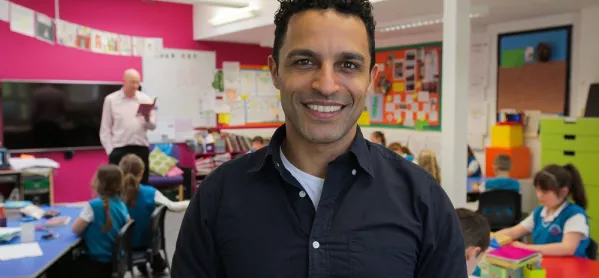- Home
- No More Boys and Girls takes gender out the classroom
No More Boys and Girls takes gender out the classroom

“I think boys are cleverer than girls,” says Louis, “because they get made into presidents easier, don’t they?”
Tiffany agrees. “I think men are better at being in charge.”
Louis and Tiffany are seven years old. They were born in 2010, the year that the Equality Act became law. But they, like their Year 3 classmates at Lanesend Primary on the Isle of Wight, have very clear ideas about what boys and girls should and shouldn’t do.
Attempts to strip them of their gender-based preconceptions form the basis of a two-part BBC documentary, No More Boys and Girls, screened next week.
Enter Dr Javid Abdelmoneim. He is a doctor of emergency medicine, which is impressive, if ultimately irrelevant to the programme. Still, it qualifies him to talk about science on TV. And so, using one group of pupils as a control (that’s how we know this is real science), he runs a series of tests on Lanesend’s Year 3.
He found considerable differences between boys and girls. But these were not innate differences: they were socially imposed. For example, 50 per cent of boys described themselves as “the best”, compared with only 10 per cent of girls.
‘Boys are sensitive’
Caroline Sice, Lanesend headteacher, was shocked by these results. “We do a lot in school, anyway,” she tells Tes. “We look at inspiriting women throughout history and today. We get in female captains and engineers. We make sure that girls and boys participate in all sports: we have mixed football and netball teams.”
However, she says, she was aware that boys were still outperforming girls in maths, and girls were outperforming boys in literacy. “We wanted to see if there was more we could do to raise their confidence and their belief, in different areas of the curriculum,” she says.
In an attempt to bring equality to the classroom, Dr Javid begins by sticking stereotype-breaking affirmations to the walls. “Girls are strong,” one sign reads. “Boys are sensitive,” another says.
Dr Javid also turns his attention to class teacher, Graham Andre. “His classroom was quite gender-biased towards the boys: superhero books and football cards,” Ms Sice says. “Though girls had a good relationship with him, he was different with them.”
Mr Andre tends to use terms of endearment for his pupils. In one morning, he calls the boys “mate” or “fella” 47 times. And he calls the girls “love”, “darling” or “sweetpea” 104 times.
“What if Mr Andre called you all ‘sweetpea’?” Dr Javid says.
“No!” the boys chorus. Some of them hide behind their chairs.
‘A bit weird’
While Mr Andre struggles to change his ways, Dr Javid asks Year 3 about their career goals. “I think a hairdresser is a girl job, because…it’s a girl job,” says Louis.
Lily, too, has strong opinions: “If I thought of a nurse being a boy, it sounds a bit weird, and it would kind of look a bit weird, as well.”
To tackle these preconceptions, Dr Javid introduces the children to a male dancer and male make-up artist, and a female car mechanic and female magician. Boys pirouette; girls learn to tell their carburettor from their exhaust.
Next, he asks the children to guess which of them will be the strongest, and which the weakest. The boys fight over who will be strongest, while the girls assume they will be weakest, thus demonstrating that boys and girls are equally inept at working out the fundamental premise of the programme they are filming.
And so, when Dr Javid brings on a strongman game, in which the children who hit the hardest with a hammer ring a bell, boys and girls perform equally well. There are tears on both sides: of happiness from the girls, and of frustration and impotence from the boys.
“We’ve got to keep doing these things,” Ms Sice says. “It’s about that exposure to different jobs, different opportunities all the time.”
She plans to paste stereotype-breaking statements all around the school, but to take them further than Dr Javid: “Girls are great at maths,” for example.
“It’s about making things equal, definitely,” she says. “It’s important that the language we use for both boys and girls as they’re learning is the language of self-belief, always.”
No More Boys and Girls: Can Our Kids Go Gender Free? is on BBC Two at 9pm on 16 August.
Want to keep up with the latest education news and opinion? Follow Tes on Twitter and like Tes on Facebook
Keep reading for just £1 per month
You've reached your limit of free articles this month. Subscribe for £1 per month for three months and get:
- Unlimited access to all Tes magazine content
- Exclusive subscriber-only stories
- Award-winning email newsletters



